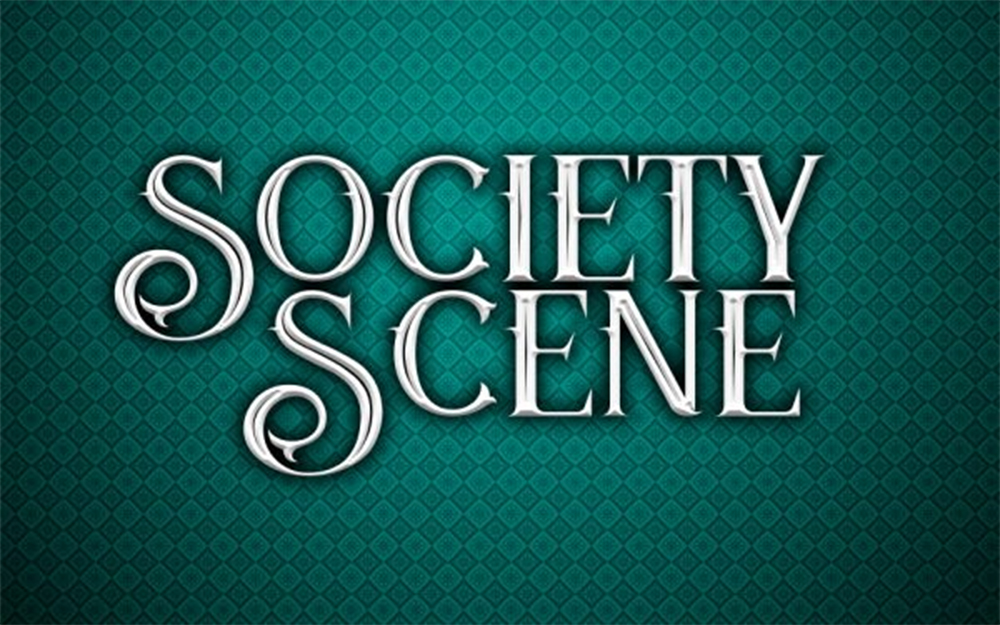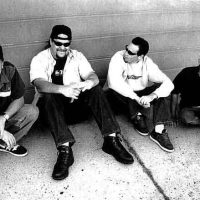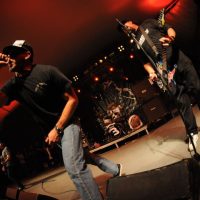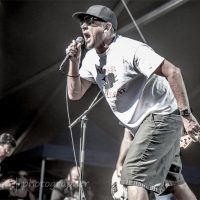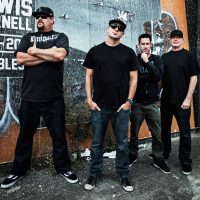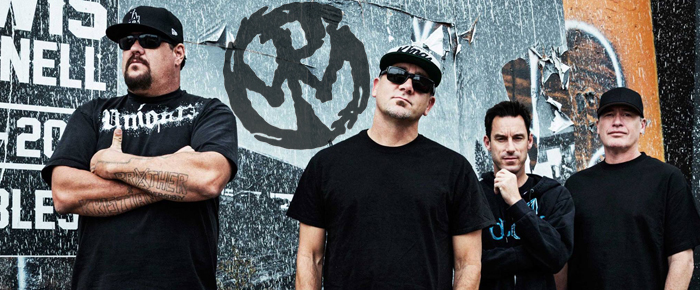
By Lisa Morgan
Few bands have left as indelible of a mark on the history of 90s punk as Pennywise. It all started around 1989 with a few friends throwing down a backyard punk rock concert in Hermosa Beach. Only their girlfriends showed up. Pushing onward, doing more shows to more people and writing more songs, their EP landed on college radio and ultimately on Epitaph, a label owned by Bad Religion guitarist Brett Gurewitz. Their 1995 release of their third studio album, About Time, brought them worldwide success. To date, the band has released 11 full-length studio albums, one live album, two EPs and one DVD. By 2007, the band independently sold over 3 million records.
Enjoying the success they’d hoped for in those early backyard days did not come easy. In fact, it came with devastating loss. Between the release of their third studio album About Time, and the recording their fourth album, Full Circle, bass player and songwriter, Jason Thirsk, left the band to address his addictions. He died from a self-inflicted gunshot wound to the chest on July 29, 1996. Full Circle came out several months after Thirsk’s death and was dedicated in his honor. In tribute of Thirsk, the band re-recorded a song from their first album Bro-Hymn and renamed it “Bro-Hymn (tribute)”.
Pennywise’s current line-up consists of Jim Lindberg (vocals), Fletcher Dragge (guitars), Randy Bradbury (bass) and Byron McMackin (drums). In 2009, Lindberg decided to leave the band, but rejoined in 2012. Their newest release Yesterdays, is a journey back in time, when they started 25 years ago. Nearly half the songs on the album were written by Jason Thirsk, and there is even a track where you can hear them as kids at their second rehearsal together. Jim Lindberg gave CV Weekly an open and honest look back through the years.
CVW: How did you go from backyards to Epitaph and touring the world?
Lindberg: Each time we played a party, more people wanted to come. Once we had written a bunch of songs, a local guy, Marc Theodore for Theologian Records, put out an EP, and it got on college radio. From there, a DJ gave it to someone at Epitaph. The second thing that really launched us was the inclusion of our music in surfing and skateboarding videos. That spread it all over the world as opposed to just LA and Southern California. I’ve always appreciated that community, and having their support was probably the most important thing that helped get our music known. When we first put out our record on Epitaph, it was during pretty violent times in Southern California; we’d just had the LA Riots. Our shows would have a lot of fights. When the surfing community started showing up, it became more about having a good time, and a lot more girls came out to the show. It just made it a lot better.
CVW: One of our readers, Johnny M. Sugarbritches, wanted me to ask if you miss those backyard concert days?
Lindberg: Everyone misses those younger days. They were really fun, and there was zero pressure to perform. Everyone was just happy to play in a backyard somewhere. Now we are doing things like going over to Belgium to do one show for thousands of people. We have to worry about your equipment breaking down, and having to let people down because of sound issues. People are also judging your performance all the time. Still, it would it would be hard to find any band not hoping that their shows get more and more popular when they’re first starting out.
CVW: In 2008, you wrote a book, Punk Rock Dad, No Rules, Just Real Life. How has been being a Punk Rock Dad been working out for you so far?
Lindberg: (Chuckles) It’s always been a unique experience. I have three daughters ages 11, 16 and 18. Our band, our guitar player in particular, is a notorious wild man, and he gets into trouble sometimes. That part I don’t really like as a dad so much. I want to provide a totally sensible, stable, parental guidance system, and it is so hard to do when you’re in a band. It’s so unpredictable what we’re going to do next. At the same time, the kids got to travel and see us play big shows and big events. My two older girls love music a lot. They go to a lot of concerts and go to Coachella every year. They are really stoked on that side of it.
CVW: I’m sure having a family is a struggle when you’re juggling a music career and everything that comes with it. Is that the reason for your departure in 2009? And what prompted your return?
Lindberg: (Heavy sigh) It’s almost too much to go into. For me, things weren’t working on a variety of levels – on levels that a band survives on. We’d just put out a record on a different label, we’d been touring consistently for a couple of years, and I needed a break after 20 years of continuing albums and touring. I needed to break up the monotony, and things were getting a little out of control. The other guys weren’t ready to take one, so they told me to go ahead, and they’d go on without me. It was difficult in that respect. They went on and did their thing and had varied level of success with someone new. But, I really enjoyed doing what I was doing with The Black Pacific. We’d just finished touring, and I was looking to do something different when Pennywise approached me and asked if I wanted to do some shows? Sometimes, you just have to put stuff behind you. Everybody’s just trying do what’s right for their career and family, but it’s not always easy. The breaking point can come when you’ve been doing it for 20 years. Band relationships are like marriages. There comes a time when the honeymoon is over and you have big fights. We needed that break, and I think it was healthy to have it prolonged.
CVW: The newest album, Yesterdays, songs written by Jason Thirsk: “Restless Time,” “Thanksgiving,” “What you Deserve,” and “Slow Down”. This album truly is about your “yesterdays”.
Lindberg: Almost half of the record is made up of the first songs we ever played together. The very last track is us practicing those songs – the second time we’d ever practiced together. It was cool to record those songs. Jason was such a huge creative factor for the band it’s impossible for me to represent the band and not to pay a huge debt for what Jason did. He’s the one who got the band going in the direction that we were going. He wrote a lot of really cool, positive punk songs. He struggled with his own demons, but he was such a loving, warm, affectionate guy, who was all about the brotherhood and his music reflected that. He was such a well loved member of our scene down at the beach. It’s great to put it out there again.
CVW: I imagine it was a pretty emotional thing to do, and maybe, at the same time, cathartic?
Lindberg: Yeah, it was. You know it would be one thing if it was someone you knew who was always depressed… maybe you could almost see something like that coming – people can understand that a bit more I guess. But someone like Jason, you’re just like, “What? Why would he do that?” To me, the only thing that makes sense is that he just wasn’t in his right mind. The Jason that I know would never want to hurt his family like that. I just blame the addictions he struggled with. It is difficult. It’s like a tragic accident. But I can see how the people who are always the most optimistic, get tired of letting people down when they just want everybody to be happy. It’s really sad.
I’ll never forget when Jason came out of a treatment program. He went in not sure he was going to live through it. When he came out, he was so happy. He was saying “Oh man, I’m so glad I found this out! I need to change… I’ve got this problem… and this is what I’ve got to do…” I was like, “Dude, I am so proud of you!” But then backsliding into all the same things that he was doing before…it just took it out of him.
Our old music is something that was important to get back to. We had a couple discussions when I came back, talking about that time in our lives. The whole band experience is about writing songs, but that had become such a chore over the years. I told them that if we were going to do this, I’d really like to get back to that. It is great playing songs and having the crowd react, but it all springs from writing that music and having that be part of the experience as well. Getting in there and rehashing those old songs was good. Andy, our bass player, had never heard several of the songs. He kept saying how cool the songs were. That was fun and inspiring.
CVW: How is the state of the band today?
Lindberg: We just got done with a 6 week US tour, and the fans came out in force, and we got along great. We’re kind of on a high note right now. That’s why it’ll be cool to come out to the desert. My parents have a place there in Indian Wells. I’ve been made aware of The Hood and the cool shows they’ve been having. And with Coachella, being such a huge focus down there, we’re all really excited about finally having a show there.
NOTE TO THE READER: Within an hour of our conversation, I received a phone call directly from Lindberg. He was deeply disappointed to have to inform me that the show scheduled for this weekend at The Hood had to be rescheduled due to a scheduling conflict with another festival, “…but we definitely plan to make up the show at a later date.” CV Weekly will be happy to announce that date as soon as it is finalized. In the meantime, The Hood Bar and Pizza in Palm Desert will be hosting the CV Music Award winning band Bridger, the long overdue return of The Butchery Boys, FACELIFT and Grand Scovell. This FREE show will start at 9pm, Saturday, May 23rd.































